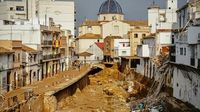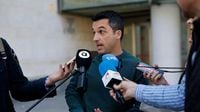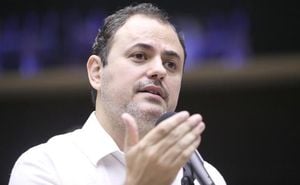On April 1, 2025, Alberto Martínez Escribano, a geologist and a key witness to the devastating floods in Valencia, expressed deep frustration over the lack of timely alerts that could have potentially saved lives during the catastrophic DANA event that occurred on October 29, 2023. Speaking in front of a judge in Catarroja, Martínez highlighted that sufficient information was available from meteorological agencies, yet the response was inadequate.
Martínez, who holds a master’s degree in natural risk planning and management, emphasized that the alerts provided by the Spanish meteorological agency Aemet, the Júcar Confederation, and Avamet were not only accessible but should have prompted immediate action. "With the information we had, the population should have been alerted via mobile alerts and sent home once AEMET activated the red alert," he stated, underscoring the missed opportunity to prevent loss of life.
During his testimony, he raised critical questions about the communication between municipal leaders, asking whether mayors upstream had informed those downstream about the impending danger. He drew a parallel to the Pantanada de Tous disaster, where 100,000 people were evacuated swiftly using only radio broadcasts and bells, highlighting that modern technology should have facilitated a more effective response.
Martínez criticized the Generalitat for not considering evacuations or issuing warnings when they raised the emergency level to 2 at 3 PM, despite the alarming information circulating on social media and news outlets regarding the water flow from Chiva. "The protocols are in place. It’s not that there isn’t an emergency law or that civil protection doesn’t function; everything is planned, it just needed to be followed," he asserted.
On the fateful day, Martínez had warned a friend at 6:50 PM about the overflowing ravine, relying on real-time data from Aemet and other meteorological sources. He noted that the days leading up to the DANA event had already provided clear meteorological forecasts, with warnings escalating from orange to red early that morning.
He recounted advising his students and colleagues at the Aldaia institute to stay home, stressing that with a red alert indicating extreme danger, everyone should have been indoors. "With a red alert, which signifies extreme danger to life, everyone should have been at home," he reiterated.
Martínez also expressed doubts about the effectiveness of the planned Cheste dam in Poyo, suggesting it would not have mitigated the severity of the flooding. He stated that channeling the ravine would not have prevented the overflow, as demonstrated by the flooding in Picanya and Paiporta, where the ravine also overflowed.
In his testimony, he described how he followed live news coverage throughout the day, witnessing rescues on Valencian public television. He pointed out that, knowing the amount of rain that had fallen in towns like Buñol and Chiva, any trained engineer would have recognized the likelihood of overflow in the Barranco del Poyo.
Martínez firmly believed that the tragedy that claimed 228 lives could have been avoided with better communication and public education regarding flood risks. He advocated for a more proactive approach to inform residents living in flood-prone areas about the dangers and necessary precautions. "The human tragedy could have been avoided. Education is essential; people need to know not to go down to garages in these situations," he concluded.
The testimonies from experts like Martínez are crucial as investigations continue into the circumstances surrounding the DANA event. The hearings aim to determine accountability and improve future emergency response protocols to prevent such tragedies from recurring.
As the region grapples with the aftermath of the floods, the emphasis on effective communication and preparedness remains paramount. The lessons learned from this disaster could shape future disaster management strategies, ensuring that timely alerts and public awareness are prioritized to safeguard lives.
In the wake of this tragedy, the call for accountability and reform in emergency response systems grows louder, with many questioning how such a devastating event could occur despite existing protocols and systems designed to protect the public. The ongoing discourse highlights the need for a comprehensive review of emergency response measures, ensuring that no one is left vulnerable in the face of extreme weather events.
Ultimately, the testimonies of those like Alberto Martínez serve as a powerful reminder of the importance of preparedness and the critical role of effective communication in mitigating the impacts of natural disasters. As the community seeks healing and justice, the hope is that the insights gained from this experience will lead to a more resilient future.





